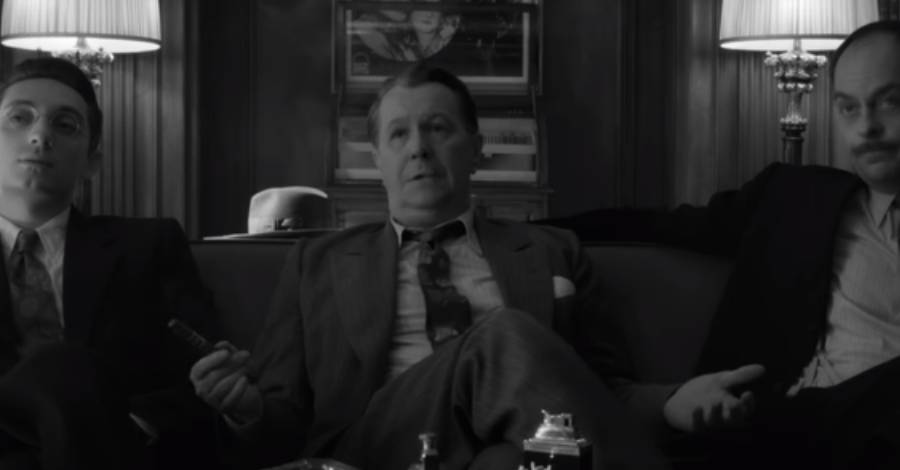David Fincher's film Mank offers a deep dive into the tumultuous world of 1930s Hollywood, chronicling the life of screenwriter Herman J. Mankiewicz (portrayed by Gary Oldman) as he crafts the screenplay for what would become Citizen Kane. The film not only explores Mankiewicz's professional challenges but also delves into his personal struggles and the socio-political landscape of the time.
Movie Summary

David Fincher's Mank offers an immersive, stylized journey into 1930s, and early 1940s Hollywood through the eyes of the brilliant yet tormented screenwriter Herman J. Mankiewicz. The film chronicles the development of the screenplay for Citizen Kane, a film widely considered one of the greatest in cinema history. Told through nonlinear storytelling, Mank intertwines Herman's present-day writing process in isolation with flashbacks that highlight his relationships with powerful Hollywood figures and the events that ultimately influenced the content and tone of his work.
What emerges is not just a portrait of a man but an exploration of the studio system, media manipulation, and political corruption, all told in the style of an old Hollywood classic. Mank balances dark humor with poignant insight as it unravels the cost of artistic integrity and moral compromise.
A Man Against the Machine: Herman's Struggle

At the heart of Mank is the battle Herman J. Mankiewicz fights—not just with alcoholism, self-doubt, and a broken leg—but with the power structures of Hollywood. He is an undeniably talented writer whose genius often gets lost in his cynical outlook and self-destructive behavior. Despite being surrounded by grandeur and prestige, Mank remains an outsider.
Mank’s assignment is to write a screenplay for a new talent in Hollywood: Orson Welles (Tom Burke), who is granted full creative control by RKO Pictures. The result is Citizen Kane, a thinly veiled portrayal of media mogul William Randolph Hearst (Charles Dance). But even as Mank pours his soul into the script, he is initially content to remain anonymous, letting Welles take full credit.
That changes as he reflects on the past—his disillusionment with the studio system, his moral conflicts, and the exploitation he witnessed. He demands credit, not out of vanity, but to reclaim his voice and expose the truth through his work.
Flashbacks: The Power and Politics of 1930s Hollywood

The flashbacks in Mank are not mere narrative devices; they are the backbone of the film’s commentary. We see Mank’s friendship with Marion Davies (Amanda Seyfried), the charming and intelligent actress who is also Hearst’s mistress. Unlike Hearst, Davies is shown to be genuine and warm, someone Mank cares for deeply.
Hearst’s opulent dinner parties provide the stage for Mank’s biting wit and reveal the symbiotic relationship between Hollywood and political power. Hearst isn’t just a media baron—he shapes narratives, influences elections, and manipulates the public, all while maintaining a seemingly benign public image.
Mank becomes increasingly disturbed when he sees the studios producing fake newsreels to sabotage Upton Sinclair’s gubernatorial campaign. His friend Shelly Metcalf (Jamie McShane), a director roped into creating these propaganda pieces, later commits suicide, wracked with guilt. This tragedy acts as a catalyst for Mank to abandon apathy and fight back in the only way he knows how—by writing.
The Tension with Orson Welles
Orson Welles (Tom Burke) is a towering figure, confident, brilliant, and unrelenting. Initially, Mank agrees to work uncredited, understanding the political implications and how controversial the script could be. But the more he revisits the corruption and betrayal he witnessed, the more he feels compelled to own his narrative.
This culminates in a confrontation between Welles and Mank after he demands credit. Welles throws a tantrum, breaking furniture in a symbolic display of fractured egos and clashing ideals. But eventually, Mank’s name appears alongside Welles’s in the credits of Citizen Kane. It is a hard-won victory, both for artistic acknowledgment and personal redemption.
Mank Ending Explained: Why It Turned Out That Way
The ending of Mank is understated but powerful. Herman J. Mankiewicz receives co-writing credit for Citizen Kane, the screenplay that would later be heralded as a masterpiece. It’s not a fairytale ending—Mank’s life remains riddled with personal issues—but it’s a deeply meaningful resolution.
Mank's insistence on credit stems from more than ego. It’s about reclaiming agency in an industry that often silences dissenting voices. After years of being used, ignored, and undermined, Mank refuses to allow his work to become another uncredited asset of the system he despises.
This outcome was inevitable given Mank's arc. He begins as a passive observer, a man who indulges in cynicism and satire without directly confronting the injustices around him. But over time, propelled by the guilt of complicity and the loss of his friend, he transforms into someone who uses his words as weapons.
The final scene echoes this quiet triumph: recognition not just by his peers, but by history.
Viewers’ Reaction to the Ending
Audiences and critics were divided in their reaction to Mank’s conclusion. Some celebrated the film’s meticulous recreation of a bygone Hollywood era, praising Fincher’s direction and Oldman’s layered performance. For these viewers, Mank’s decision to demand credit was seen as a cathartic, principled stand—a writer finally owning his story.
Others, however, took issue with the film’s historical perspective. Mank is partly inspired by Pauline Kael’s essay Raising Kane, which controversially argued that Mankiewicz was the true author of Citizen Kane. Many critics and scholars have disputed this, pointing to Welles’s substantial contributions. As a result, some viewers felt the film’s portrayal of Welles was overly reductive.
Despite the controversy, the ending resonated with many as a poignant reminder of the unsung artists whose names rarely make it into the spotlight. In a time when creative ownership continues to be debated, Mank’s story struck a chord.
Conclusion
Mank is a film about legacy, power, and the unrelenting pursuit of truth through art. It doesn’t offer simple heroes or villains—instead, it gives us complex characters navigating a treacherous industry. Through Herman J. Mankiewicz’s eyes, we see the price of integrity, the wounds of betrayal, and the quiet power of having one’s name rightfully acknowledged.
David Fincher’s masterful direction and the screenplay by his late father, Jack Fincher, breathe life into a Hollywood story that still feels relevant today. Whether you view Mank as a hero, a victim, or something in between, one thing is clear: he mattered. And thanks to Mank, so does his voice.






